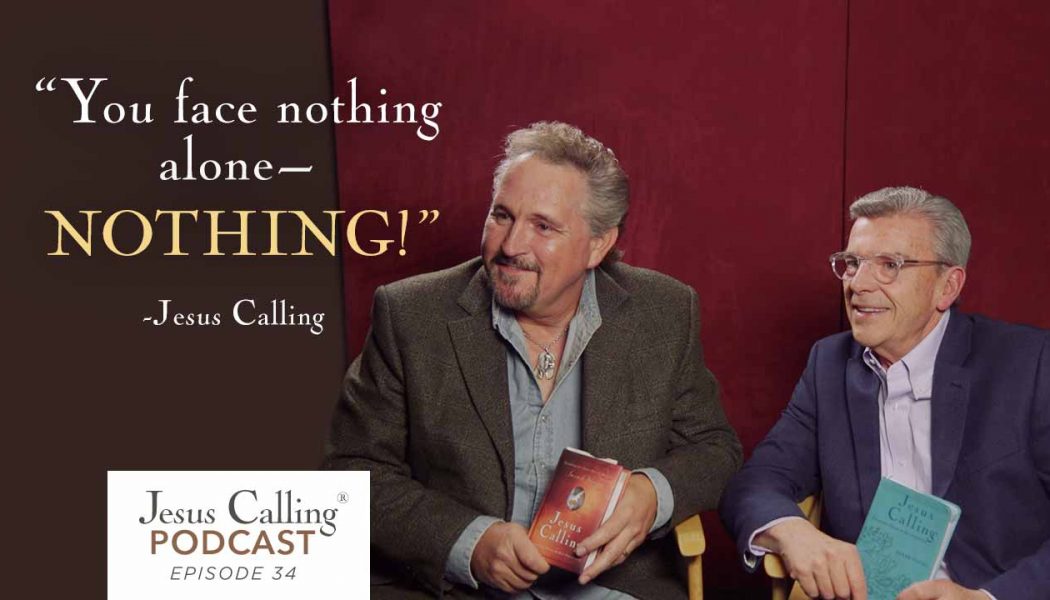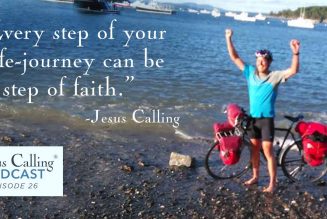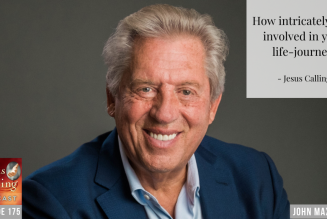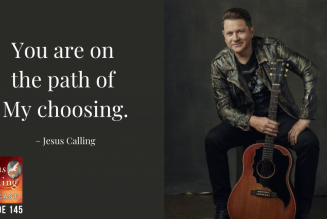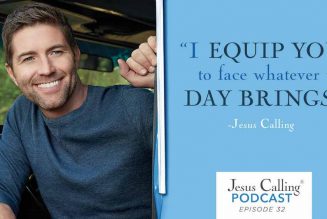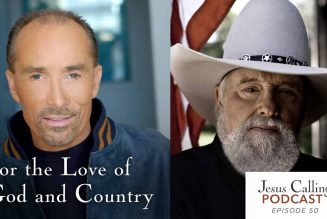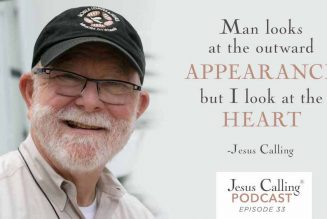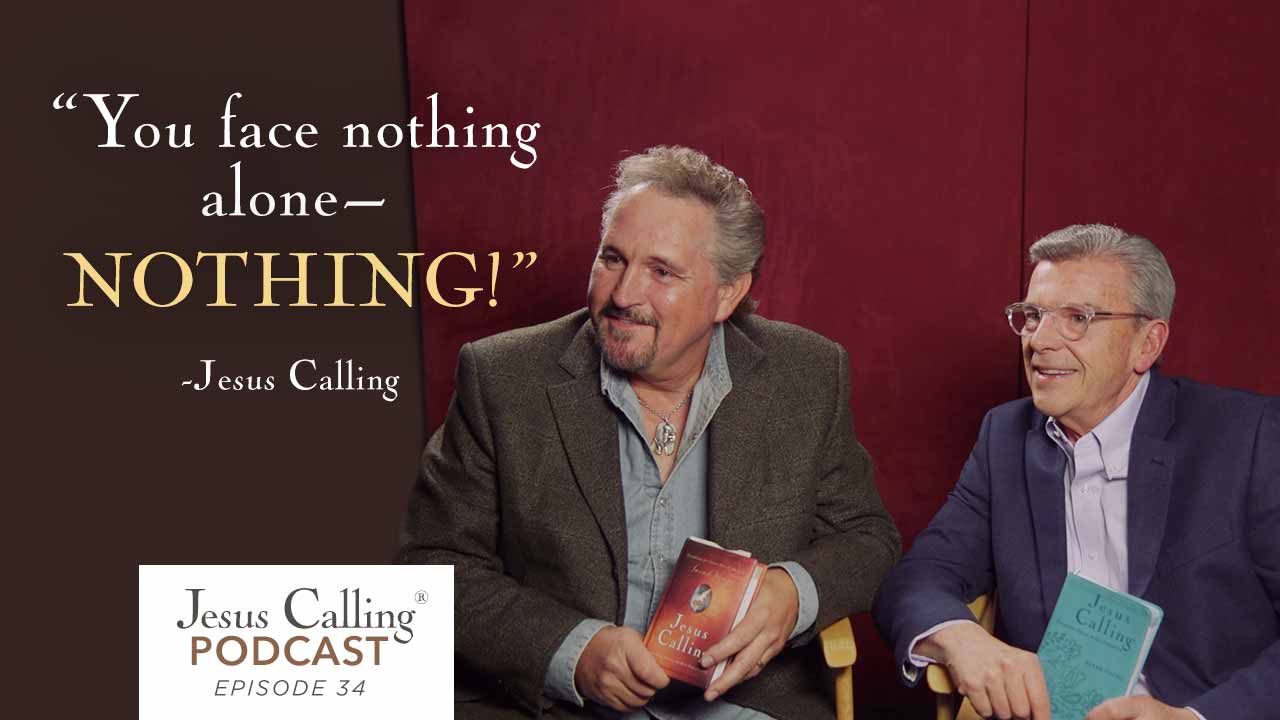
Long time friends Marty Roe (lead singer of Grammy® Award winning country music group Diamond Rio), and J.T. Olson (founder and executive director of Both Hands Foundation and author of the book The Orphan, The Widow and Me) share how God led them to guide a ministry that is bringing help and hope to both orphans and widows.
Note from the producer: Tell us the kinds of stories and topics you want to hear from the Jesus Calling Podcast! Click here to take a survey and let us know a little about you so we can continue to bring you the kinds of guests and inspirational stories you love.
J.T. Olson: Life is like this big tapestry and when we’re going through life so much of it is…we’re in the back of the tapestry and all we see is threads hanging out. We see a little bit of a rough design, but it doesn’t look like a whole lot. But when you turn it over, there’s this beautiful picture. That’s really kind of saying, “Oh, this makes all makes sense now.”
Narrator: Welcome to the Experience Jesus Calling podcast. Today we speak with Marty Roe, the lead singer of Diamond Rio—a Grammy Award winning country music group, and J.T. Olson, the founder and executive director of Both Hands Foundation and author of the book about his life and his ministry entitled The Orphan, The Widow and Me. These two long-time friends share the story of how God led them to guide a ministry that is bringing help and hope to both orphans and widows.
Marty Roe: I’m Marty Roe. I’m the lead singer of Diamond Rio.
I was born in a church house, pretty much. I was about a week old the first Sunday I ever attended church. I grew up in a Church of Christ in southern Cincinnati, and like I said growing up on a farm, lot of farmers. My dad was a teacher, but we also farmed. Like most teachers, he had more than one job. There never was a time that God was not the major part of our our life growing up.
J.T.: I’m J.T. Olson, the executive director of Both Hands Foundation and the author of a new book called The Orphan the Widow and Me.
I was raised on a farm in northeastern Iowa and we had five kids in our family. It’s really beautiful; beautiful part of the country and I had a great childhood growing up there on a farm.
“What’s going to happen to us?” – J.T. recalls his early life.
J.T. March of 1969. I remember I’d spent the whole day playing in my buddy’s barns. I was pretty dirty and I went down to the basement to take my boots off and I remember sitting on this chair and unlacing my boots and my oldest brother came down the basement stairs. I looked up at him and I said, “are Mom and Dad home?” I was excited to see Mom and Dad. They had left to go celebrate their 16th wedding anniversary. Us five kids were kind of farmed out to different places, and Saturday came along and they were coming home and we were being brought home.
He just looked at me and he said “Mom and Dad are dead,” and I was shocked, you know, I said “what?” He said “mom and dad are dead. They were killed in a car accident an hour ago.”
And he turned around and went upstairs and I just remember hitting the floor that cold cement floor and wailing. I think the way any 12-year old would wail. I mean it’s when I think about and I think back on that would be referred to as an earth shattering experience. I mean that’s the only way I can think about it. Because everything that you hold dear, everything that’s important, the things that keep you tethered, the things that make life make sense; when you’re 12, parents are a big part of that; and it’s gone.
The things that happen to you, when you hear the fact your mom and dad are gone, one of the things that goes through your head is, “what’s going to happen to us? Who’s going to take care of us?” I know there’s a lot of kids in the foster care system who weren’t as lucky as I was to have family.
…everything that you hold dear, everything that’s important, the things that keep you tethered, the things that make life make sense; when you’re 12, parents are a big part of that; and it’s gone.
We were very fortunate, us five kids, because my mom and dad had some foresight, and about three months before the accident, they had changed their will. So that if anything would ever happen to them, my aunt and uncle; my mom’s sister and her husband, would take the kids and vice versa. They lived in a very nice suburb of Milwaukee called Brookfield. They took all five of us in. So they’re my heroes.
A Genuine Introduction Between Marty and J.T.
Marty: My first memory of a genuine introduction and kind of a stripped down moment between J.T. and I. We bought a house, we moved in and the neighbors next door had four little kids. Within the first week or two our two small children, one which was basically a year old, I guess Sarah was–just a toddler.
They kept running back and forth between the houses and they made a basically made a muddy path between the two houses. We hadn’t really met, and we hadn’t really had a lot of time together.
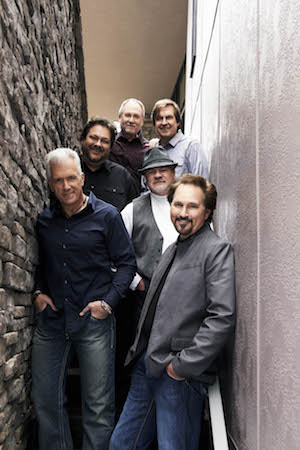 I grew up on a farm also, so I had a bunch of rocks on our property and I picked up all these big rocks and said “we’re going to make a path between our house and their house.” I was edging it out and putting rocks in there and right up into his driveway. I don’t really know where the property line was, but while we’re doing that he comes out and and it just kind of hit me. “Hey is it OK that we do this?” We’ve been there 21 years and we’re family.
I grew up on a farm also, so I had a bunch of rocks on our property and I picked up all these big rocks and said “we’re going to make a path between our house and their house.” I was edging it out and putting rocks in there and right up into his driveway. I don’t really know where the property line was, but while we’re doing that he comes out and and it just kind of hit me. “Hey is it OK that we do this?” We’ve been there 21 years and we’re family.
It’s been an absolute Godsend. You know you could hope for those kind of things, as you’re raising a family–those kind of close knit neighborhoods. God was good to me. I travel a lot for a living and I’m not home. Especially back then, I wasn’t home very much and it was a comforting thought to know that we had an “anytime friend” right next door.
You know you could hope for those kind of things, as you’re raising a family–those kind of close knit neighborhoods. God was good to me.
We do a Monday night football with the guys and watch Monday night football literally on the deck at my house.
J.T.: The best way to watch football I might add.
Marty: We have a lot of fun. But we also get a chance to share some hopes and dreams and things there. J.T. was telling us all about this experience; had left a long career with Southwestern and then started his own business. I was impressed by his passion to really find what he was, kind of in his mid-life scenario, definitely in his work anyway, and was very, very diligent about trying to find how his second half of his life could more benevolent, a little more focused on God’s will, and maybe a little less on his own personal career.
“That’s a good idea” – The First Both Hands Project
J.T.: The way it all started it was I was on the board of Bethany Christian Services. My job that year was to do the fundraiser. I was in charge of that, so I thought we’d do a golf tournament, where you mail letters out to people and say “would you sponsor me while I golf.” I did that and we it all going, and I sent my letters out like I was supposed to. I had a buddy who I was in a bible study with. He sends my letter back to me and he doesn’t send me a check. He just scribbles on my letter he says, “J.T. if you told me you were working on a widow’s house I might sponsor you, but you’re just golfing. Nice cause, but not my money.” It hurt my feelings a little bit, but at the same time I thought, “that’s a good idea.”
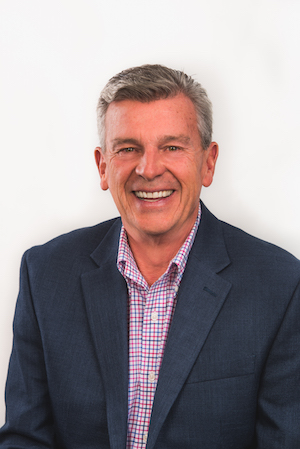 When I called him a couple of days later we talked about it and laughed about it. He still didn’t give me any money. But the idea never left me. Whenever I saw a golf tournament or 5K race or anything like that I kept thinking, “if they were working on a widow’s house, would that be more compelling?” About three years later I run into a friend of my church; hadn’t seen him a couple months. “I said what’s up?” He said I’m adopting four kids from Moldova. I said “what happened?” He said, “I went over there on a mission to deliver beds to orphanages. Fell in love with this 11-year old boy. Started the adoption process and found out he’s got three siblings and we’re just not going to break the siblings up.” Well, I’m the just right guy to say that to, because you know I’m kind of all for keeping the siblings together; having been a product of that. Don already had three kids. So, I asked Don, I said, “how much is it going to cost?” He said, “about sixty-five thousand dollars.” I said, “you know how you’re going to raise it?” He said, “no.” I said “I think I’ve got an idea.” So long story short, we got about 13-14 guys, we all mailed letters out to everyone we knew saying “would you sponsor me for the day while I work on this widow’s house.” I found a widow in Nashville who needed help. I got all the supplies donated.
When I called him a couple of days later we talked about it and laughed about it. He still didn’t give me any money. But the idea never left me. Whenever I saw a golf tournament or 5K race or anything like that I kept thinking, “if they were working on a widow’s house, would that be more compelling?” About three years later I run into a friend of my church; hadn’t seen him a couple months. “I said what’s up?” He said I’m adopting four kids from Moldova. I said “what happened?” He said, “I went over there on a mission to deliver beds to orphanages. Fell in love with this 11-year old boy. Started the adoption process and found out he’s got three siblings and we’re just not going to break the siblings up.” Well, I’m the just right guy to say that to, because you know I’m kind of all for keeping the siblings together; having been a product of that. Don already had three kids. So, I asked Don, I said, “how much is it going to cost?” He said, “about sixty-five thousand dollars.” I said, “you know how you’re going to raise it?” He said, “no.” I said “I think I’ve got an idea.” So long story short, we got about 13-14 guys, we all mailed letters out to everyone we knew saying “would you sponsor me for the day while I work on this widow’s house.” I found a widow in Nashville who needed help. I got all the supplies donated.
So we didn’t spend any money, and we spent the day working on her house. When it was over, we’d raised over fifty-five thousand dollars. That was the first Both Hands project. It was just amazing. I literally felt like I was on hallowed ground because I was expecting maybe ten or fifteen thousand; but fifty-five thousand? I was just blown away. That started a little bit of my discontentment with my job. All of the sudden I got a taste of what it was like to do that. It was just totally different than the particular business I was in, which was recruiting and stuff like that. I had a friend of mine who came up to me after we did Don’s project and he said “Would you help me with one?” So we did another project and it was at the end of that project in April of 2008 where it hit me I thought, “this is what I’ve got to do.” About four months later I end up leaving my company and starting Both Hands officially.
Recognizing God’s Footprint in Your Life
Marty: He told me about the project he did with Don and his idea. I saw something that was very marketable. Basically, all I did was just encourage him and I became a cheerleader on the front end there just said man, “This is a spectacular idea.” I think even then I might have said, “you need to write a book. You need to get in and get this figured out.” Then I got a chance to be, I don’t know if it was the second or the third project that we did down in Franklin. We were part of that and I wrote letters; I’m not very good at asking for help. It’s been a learning process for me.
J.T.: He’s gotten good at it though.
Marty: I got involved with that and I went through the process that he had done and he’d actually had kind of begun to get a pretty good business model. We had a lot of discussion, a lot of cheerleading there on the deck and hearing the results on the front end, honestly didn’t surprise me that much. It excited me and it confirmed, I think that’s what he felt, a confirmation that this is something; God is rewarding this. So I tried to do my part to support it. At some point we really became a little more official and needed a board and he asked me to do that, which is basically just do the same thing I’ve been doing and that’s try to be a good sounding board and a cheerleader.
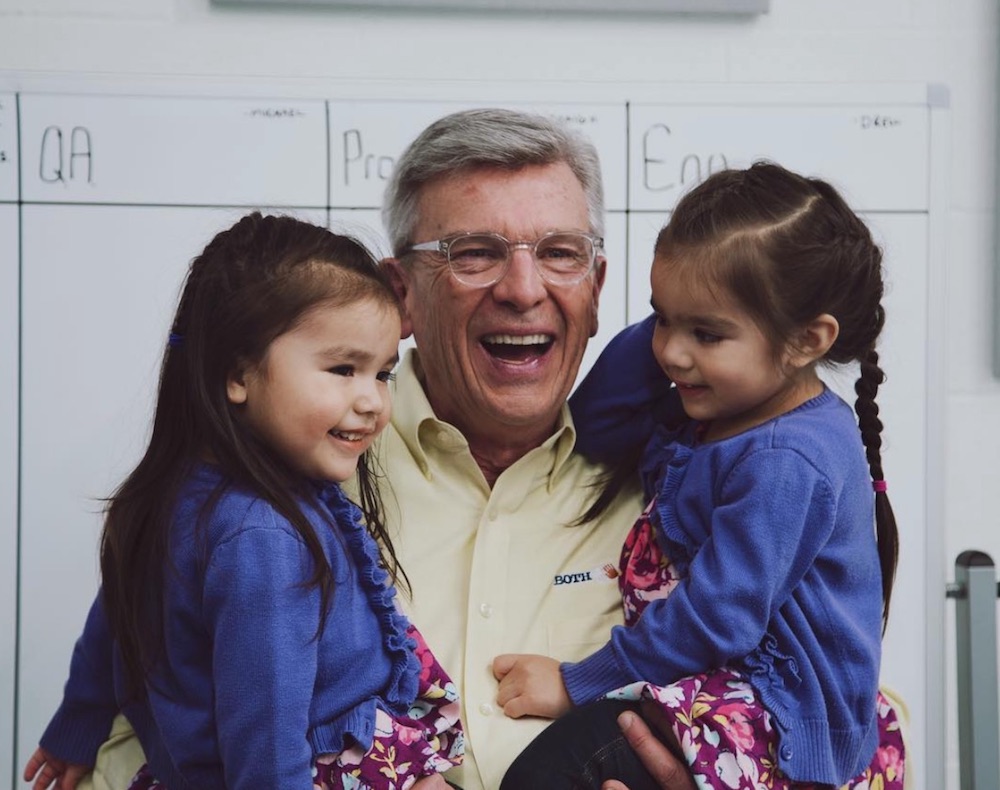
The very very first one that I was a part of that to watch the transformation of a widow’s home in a day’s time and to see the the actual impact on her and the fact that the adoptive family is actually there working on the project too. They’re a part of this. They don’t just sit back and receive something and do nothing. They are engaged. The widow gets engaged with the adoptive family and hopefully and historically we’ve had lots of widows and adoptive families who develop lasting relationships through that.
We have videos of every project we’ve ever done; we ask them to do that. How many have we done, now?
J.T.: Six hundred and fifty three.
Marty: Six hundred and fifty-three projects. And every time I watch a video I cannot keep from weeping with joy about it. It is emotional because it’s just a pure act of kindness. Our theme scripture that God gave J.T.: James 1:27 “the purest form of religion is to minister to widows and orphans.”
Stories like J.T.’s and the fact that God has placed our families close to one another; I don’t believe that that’s an accident. That’s part of God’s taking care of us and giving us an availability. I think everybody has those. I think my knowledge and awareness of my spirituality and the Lord, only allows me to recognize God’s footprint in my life. So it causes me to be maybe be a little more readily aware and grateful for it than someone who is not as aware. He’s there. He’s chasing us.
The Encouragement of Jesus Calling
Narrator: J.T. and Marty have raised over 7.1 million dollars for families to use for adoption, impacting hundreds of orphans who have been able to be placed with a loving families. They continue to trust God that He will enable them to do another 150 projects this year alone. J.T. and Marty seek out God’s guidance by reading His Word daily, and they both enjoy the encouragement that Jesus Calling brings to their lives.
Marty: My wife and I mentor a group of kids in our Sunday school at church we call it a “lifeguard group” and you took kids from the seventh grade through their senior year of high school. And our neighbor across the road was one of our children which we had known him, Ty Jr. and his dad and mother, I went to college with, they also knew him.
We conned them into buying a house on our street so we could get our kids together. It’s been a great story. So Ty Jr. was using this and he kind of introduced me to it, so I got a hold of one, but it became a little more important to me know when we lost Ty in a car accident in 2012.
J.T.: I heard about it too, because one of the things that they talked about at Ty’s funeral was “what did he read that morning?” He was reading the Jesus Calling book and it was obvious from some things they found and the discussions he was having with people. So as a gift his mom and dad bought a bunch of copies of it and just gave it away to everybody.
An hour is not long enough for me most the time, these days. I am always sad that I have to stop. That’s the truth.
Marty: I got mine out and I would I do have some highlighting one is April 1st, April Fools Day of all things. It’s just one line out of that that I highlighted and it’s “a successful day is one in which you have stayed in touch with me,” and I can vouch for that. Cause I have days where I have to get up early and I don’t get a chance to do my devotional time. You know it started out as a discipline. OK, I’m going to spend 15 minutes just in the Word; I didn’t have any other tools helping like Jesus Calling or anything, I’m going open up the Bible and read some Scripture and pray.
An hour is not long enough for me most the time, these days. I am always sad that I have to stop. That’s the truth.
Paying It Forward With Both Hands
Marty: We all have unique situations that we’ve come through and challenges and trials that uniquely equip us to minister to other folks who have that same same thing. And J.T. has just walked that line. You know if it was some other scenario, he’s not equipped for that. But this is what he’s been equipped for and he’s stepped in faith for that. And I’m forever grateful and proud to know the guy.
J.T.: You know it’s funny because whenever I tell the “Both Hands” story to a group, for the last five six years, someone always comes up to me at the end and says, “you should write a book.” And so we did.
The Orphan, The Widow and Me and the subtitle is “Paying It Forward With Both Hands.”
BothHands.org. You can also get J.T.’s book, The Orphan, The Widow and Me on BothHandsBook.com.
Narrator: Next time on the Experience Jesus Calling podcast, we speak with Lee Ann Mancini. Lee Ann is an author, a speaker and a Bible teacher who writes stories for kids that help them explore their faith.
Lee Ann: What led me to write my first children’s Christian book, was the fact that when my children were small, I could not find any books that showed characters actually praying to Jesus. We always found books that talked about Jesus. I wanted my kids to see that there were situations in their life, difficulties that they face in school, and that they could actually go to Jesus and pray to Him. And I also wanted to instill in them the love and compassion for others to be like Jesus.
Narrator: Our feature passage for today’s show comes from the April 1st Entry of the Jesus Calling audiobook.
I am calling you to a life of constant communion with Me. Basic training includes learning to live above your circumstances, even while interacting on that cluttered plane of life. You yearn for a simplified lifestyle, so that your communication with Me can be uninterrupted. But I challenge you to relinquish the fantasy of an uncluttered world. Accept each day just as it comes, and find Me in the midst of it all.
Talk with Me about every aspect of your day, including your feelings. Remember that your ultimate goal is not to control or fix everything around you; it is to keep communing with Me. A successful day is one in which you have stayed in touch with Me, even if many things remain undone at the end of the day. Do not let your to-do list (written or mental) become an idol directing your life. Instead, ask My Spirit to guide you moment by moment. He will keep you close to Me.
Narrator: Hear more great stories about the impact Jesus Calling is having all over the world. Be sure to subscribe to the Jesus Calling Podcast on iTunes. We value your reviews and comments so we can reach even more people with the message of Jesus Calling. And if you have your own story to share, we’d love to hear from you. Visit JesusCalling.com to share your story today.
